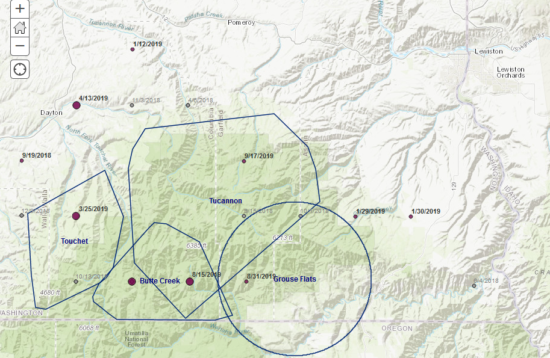
First Wolf In Washington’s Blues Removed After Cattle Attacks
WDFW reported today that it took out a Grouse Flats wolf late last month, making it the first to be killed by state managers in Washington’s Blue Mountains in response to cattle depredations there.

The agency describes the animal as an adult female and says it’s likely the breeding female of a pack that numbered at least nine before Director Kelly Susewind authorized the incremental removal operation Sept. 24.
The Asotin-Garfield County wolves are blamed on at least seven attacks on cows and calves since August 2018, including four in the last 10 months and two in a recent 30-day period.
The incidents occurred on a mix of federal and state grazing lands and private ground.
WDFW says it’s now entered the evaluation period with the pack to see if the removal changes its behavior, “for example by disrupting the overlap of wolves and livestock, or reducing the caloric intake needs for the pack.”
There are six adults and two juveniles in the group, according to spokeswoman Staci Lehman.
The removal occurred Sept. 25, nearly a week before Gov. Jay Inslee sent WDFW a letter to do more nonlethal and less lethal management of wolves elsewhere in Eastern Washington.
“We must find new methods to better support co-existence between Washington’s livestock industry and gray wolves in our state. The status quo of annual lethal removal is simply unacceptable,” the governor wrote Sept. 30 about issues in the Kettle Range that cropped up during the summers of 2019, 2018 and 2016, primarily with Diamond M Ranch cattle grazing in the Colville National Forest.
By one count, around a dozen and a half wolves — members of the Profanity and Old Profanity Territory Packs — have been removed there following chronic depredations of dozens upon dozens of cows and calves.
Wolf advocates welcomed the news while WDFW’s response to Inslee’s request was said to be “muted” by the Capital Press.
The ag-world news source also paraphrased the federal forest’s range supervisor as saying “that he doesn’t know of anything else to test, short of canceling grazing permits or closing allotments” to do in terms of nonlethal tactics.
“Anything outside of that, we have tried,” Travis Fletcher told the Press. “I would say there’s not a producer we work with who hasn’t adjusted their practices in some way.”
Inslee asked WDFW to fast track an ongoing lethal management guidelines update and work with the Forest Service, as well as gave the agency a Dec. 1 deadline for a progress report.
Most Washington wolf packs stay out of trouble with livestock, 90 percent, according to WDFW, a higher percentage than nearby states.
